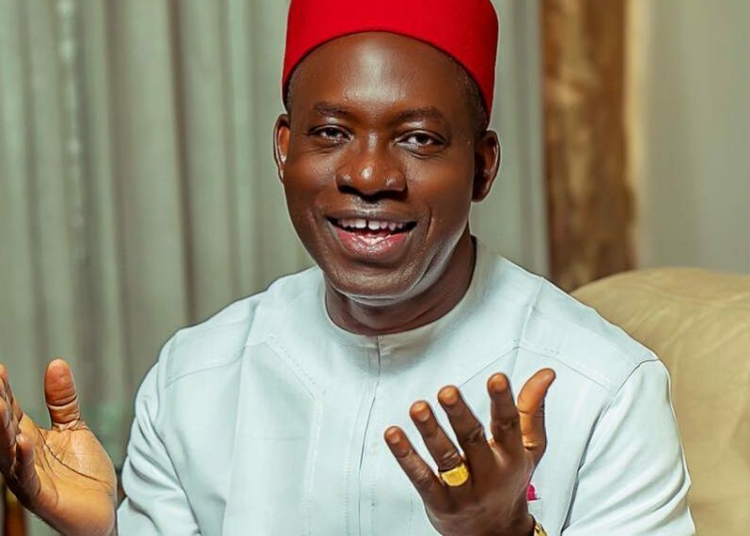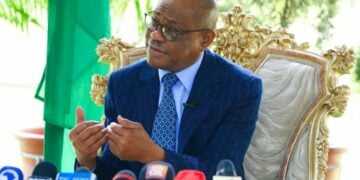Last weekend the Anambra election came and went, and a winner has emerged. The Anambra election was also seen as a litmus test for the new Independent National Electoral Commission chairman, Josh Amupitan.
I remember when I made political predictions for the year – I said Charles Soludo would win the election, and it was indeed a landslide. Soludo won in all the local governments. It was no contest. I will advise any of the losers not to waste time and money going to court. It was a no show from start to finish.
Soludo, who polled a total of 422,664 votes, defeated his closest rival, the candidate of the All Progressives Congress, Nicholas Ukachukwu, who scored 99,445 votes, while the candidate of the Young Progressives Party, Sir Paul Chukwuma, came third with 37,753 votes. According to INEC, a total of 16 candidates from various political parties participated in the election.
My thoughts on this result? It was as predictable as Lagos traffic on a Monday morning. But what shocked me to my bone marrow was not Soludo’s victory, but the catastrophic performance of some major parties.
The biggest disappointment was the once-touted biggest party in Africa, the Peoples Democratic Party (PDP), which gathered just 1,000 votes. Yes, you read that correctly – one thousand votes! So the PDP has gotten to a level where it gathered less than 1 percent of votes in an election in the south east. The same south east that used to be the stronghold of the PDP.
Granted, the All Grand Progressive Alliance (APGA) has been holding sway in Anambra for over 20 years, but the PDP has always had a good showing in the state. To go from being a major contender to gathering 1,000 votes is not just a defeat – it’s a humiliation of epic proportions.
Come to think of it, you can now see the reasons why PDP governors are defecting in droves. Who wants to remain in a sinking ship? The party that ruled Nigeria for 16 years cannot even muster 2 percent of votes in what used to be its stronghold. The decline is stunning and complete.
What happened to the PDP? How did Africa’s biggest party become a footnote in Anambra politics? The answer is simple – internal crises, leadership failure, and complete disconnect from the people. When a party spends more time fighting itself than connecting with voters, this is the result.
Another big disappointment was the opposition coalition of African Democratic Congress(ADC) and Labour Party, which has failed to take flight. After all the noise about joining forces to challenge the ruling party, their combined performance in Anambra was nothing to write home about. It seems forming coalitions and holding press conferences is easier than actually winning votes.
The Labour Party, which rode the wave of the Obidient movement in 2023, has clearly lost momentum. Their poor showing in Anambra suggests that whatever magic they had in the last general election has evaporated. Political capital depreciates faster than the naira when you don’t manage it properly.
One major lesson I learned from this election is that we have not solved the problem of voter apathy. The state had 2,788,864 registered voters, but only 598,229 were accredited. That’s barely 21 percent of registered voters! A total of 595,298 votes were cast, while 11,244 votes were rejected across the 21 local government areas.
This means almost 80 percent of registered voters stayed home. When only one in five registered voters shows up to vote, we have a serious problem. Either people don’t believe their votes matter, or they’re just tired of the whole electoral process. Either way, it’s a damning indictment of our democracy.
The question is: what are we doing wrong? Why do Nigerians collect their PVCs in millions but refuse to vote? Is it apathy, fear, or just a belief that elections don’t change anything? Until we answer these questions honestly, we’ll continue to have elections where the majority of eligible voters are spectators rather than participants.
Another issue that came up during the election was vote buying. I heard there were cases of vote buying, and we also saw pictures of underage voters participating in the election.
These are serious issues that undermine the credibility of any electoral process.
Vote buying has become so normalised in Nigerian elections that some voters now see it as their entitlement. “If you want my vote, pay for it” has become the attitude of many voters. This is tragic because it reduces democracy to a transaction rather than a civic duty.
The presence of underage voters is even more troubling. How are children getting registered to vote? Where are the biometric verification systems that are supposed to prevent this? If INEC cannot prevent underage voting, what confidence can we have in the overall integrity of the electoral process?
But overall, I think INEC did well in conducting the election. The same day, over 90 percent of the results were already uploaded on IREV (INEC Result Viewing Portal). This is a significant improvement from past elections where results took days to upload, giving room for manipulation and rigging allegations.
The real-time uploading of results on IREV is one of the best things to happen to Nigerian elections. It makes rigging more difficult and increases transparency. When results are uploaded from polling units immediately, it becomes harder to manipulate figures at collation centers. INEC should be commended for this innovation and encouraged to maintain it.
The new INEC chairman, Josh Ampitan, passed his first major test. The Anambra election was relatively peaceful, results were announced promptly, and the process was largely transparent. If he can maintain this standard in future elections, Nigerians might begin to have more faith in the electoral process.
However, INEC must address the issues of vote buying and underage voting. Technology alone cannot solve these problems – there must be consequences for violators. Political parties and candidates caught buying votes should be disqualified. Officials who register underage voters should face prosecution. Without consequences, these problems will persist.
For the PDP, this election should serve as a wake-up call. You cannot continue with internal crises, leadership squabbles, and disconnect from the masses and expect to win elections. The party needs serious restructuring and rebranding if it hopes to remain relevant in Nigerian politics.
For the opposition coalition of ADC and Labour Party, they need to understand that press conferences and social media activism don’t win elections. You need grassroots structures, credible candidates, and clear messages to voters. Without these, all the coalitions in the world won’t help.
For Soludo, this landslide victory is both a blessing and a burden. The people of Anambra have given him an overwhelming mandate. Now he must deliver on his promises. The margin of his victory means he has no excuses for failure. Anambra people are watching, and they will judge him by his performance, not his promises.
As we move toward future elections, the lessons from Anambra are clear: credible leadership wins votes, internal party crises kill parties, voter apathy remains our biggest challenge, and technology can improve electoral integrity if properly deployed.





